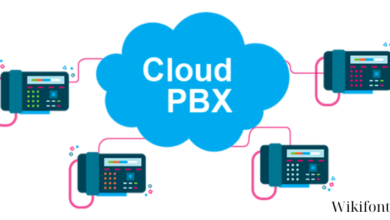The Benefits of Cloud Storage for Enterprise Data Management

Today’s hurried corporate environment has made managing enterprise data more difficult. Businesses produce and analyze enormous amounts of data every day, so it’s critical to have a solid data management plan in place. Cloud storage is one option that has grown in popularity recently. Businesses may store and retrieve their data online thanks to the cloud storage enterprise solution. The advantages of cloud storage for enterprise data management will be discussed in this article from Wikifont.net.
The Benefits of Cloud Storage for Enterprise Data Management
Cost-effective Storage Solution
The fact that cloud storage is a reasonably priced storage option is one of its key advantages for businesses. On-premises servers and data centers are examples of traditional storage options, but they can be expensive to buy, operate, and upgrade. Contrarily, cloud storage enables businesses to store their data in the cloud, negating the need for costly hardware and software investments.
With cloud storage, enterprises only pay for the storage they need, and they can easily scale their storage capacity up or down as their needs change. This can be especially beneficial for enterprises that have fluctuating storage requirements. With cloud storage for enterprise, they can reduce their upfront capital expenditures and switch to an operational expenditure model, which can provide significant cost savings over time.
Scalability and Flexibility
Cloud storage’s scalability and flexibility for businesses are further benefits. When using conventional storage solutions, businesses frequently have to buy more storage capacity than they require in order to account for future expansion. Particularly if the enterprise’s storage needs do not increase as anticipated, this can be a pricey and ineffective strategy.
The flexibility and scalability of cloud storage for enterprise are unparalleled. They don’t need to invest in new hardware or software in order to simply increase or decrease storage capacity as needed. Businesses can easily adjust for unforeseen expansion or decrease their storage capacity as needed thanks to this. In addition, cloud storage companies frequently give a variety of storage choices, from affordable cold storage to high-performance storage that may be tailored to an organization’s specific requirements.
Enhanced Security
Businesses of all sizes have a serious issue with enterprise data security. Data security using conventional storage options might be jeopardized by physical theft or damage to the storage hardware. It’s also possible that conventional storage solutions don’t contain the most recent security features or protocols to fend off cyberattacks.
On the other hand, cloud storage offers improved security capabilities to safeguard corporate data. To guarantee that data is safeguarded from both physical and digital threats, cloud storage for enterprises providers heavily invest in data security, including encryption, firewalls, and other security measures. Additionally, teams of security specialists are frequently employed by cloud storage providers to keep an eye on the safety of their systems around-the-clock so that any risks may be immediately identified and eliminated.
Improved Collaboration and Accessibility
Modern businesses with staff working in many locations and time zones need collaboration and accessibility. Teams may find it challenging to collaborate effectively with traditional storage options because of physical distance. Furthermore, accessing data from conventional storage solutions can be laborious and time-consuming, particularly if the data is spread across several locations.
On the other hand, cloud storage offers better advantages for accessibility and collaboration. Teams can collaborate on the same papers and files using cloud storage, regardless of where they are physically located. Teams may access their data from anywhere, at any time, thanks to the mobile apps and web-based interfaces that cloud storage providers frequently provide. No matter where team members are situated, organizations can easily collaborate and access their data thanks to this.
Disaster Recovery and Business Continuity
For firms of all sizes, business continuity and disaster recovery are crucial issues. Disaster recovery with conventional storage solutions can be challenging and expensive, necessitating the acquisition of additional hardware and software by enterprises to back up their data. The most recent backup and recovery technologies could not be included in conventional storage systems, which can make it challenging to recover from data loss in the event of a disaster.
On the other hand, cloud storage offers a complete solution for business continuity and disaster recovery. In order to safeguard organizational data from loss due to disasters or other occurrences, cloud storage for enterprise frequently offers backup and recovery services. Furthermore, many cloud storage companies have numerous data centers spread out around the country, ensuring that data is duplicated and backed up in numerous locations for redundancy and resilience in the case of a crisis.
Easy Integration with Other Services
Finally, cloud storage offers easy integration with other cloud services, such as cloud computing and cloud applications. This can be beneficial for enterprises that are looking to implement a comprehensive cloud strategy. By integrating cloud storage for enterprise with other cloud services, businesses can create a more efficient and streamlined IT infrastructure, which can improve productivity and reduce costs.
For instance, by combining cloud computing with storage, organizations may run their apps and store their data in the cloud, doing away with the need for pricey on-premises gear and software. Additionally, businesses can improve workflows and make it simpler for teams to communicate and access data by connecting cloud storage with cloud apps.
Conclusion
To sum up, cloud storage for enterprise data management has many advantages. It is an affordable storage option that is extremely scalable and versatile, has improved security features, enhances collaboration and accessibility, offers complete solutions for disaster recovery and business continuity, and permits simple interaction with other cloud services. These advantages have made cloud storage a crucial tool for contemporary enterprises trying to handle their data effectively and efficiently.
Conclusion: So above is the The Benefits of Cloud Storage for Enterprise Data Management article. Hopefully with this article you can help you in life, always follow and read our good articles on the website: Wikifont.net







